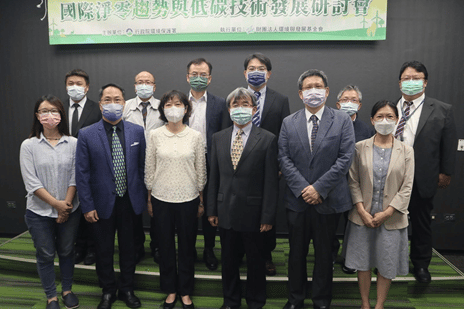In response to the increasing conversation about the impact of climate change, the Taiwan Environmental Protection Administration (EPA) and Environment and Development Foundation (EDF) organized the International Trend of Net Zero and Low-Carbon Technology Development Forum earlier this month to consolidate the net zero target in various fields. Michael Lu, U.S. Grains Council’s (USGC’s) director in Taiwan, was one of only six speakers invited to take part in the forum.
Through conversations between industry, government, academia and cross-domain technical representatives, the forum reinforced all efforts toward a 2050 net-zero vision.
In terms of carbon reduction in the transportation sector, Lu shared the U.S.

experience in developing ethanol-blended fuels that both reduce greenhouse gas (GHG) emissions and mitigate air pollution.
“As corn ethanol carbon intensities have decreased over the last 15 years, the effects of carbon reduction are even more significant. There are more than 60 countries around the world adopting ethanol-blended fuel as a key strategy for carbon reduction. Furthermore, F1 Motorsport is also utilizing ethanol as the main fuel,” Lu said.
Per a study by Dr. Steffen Mueller, PhD, Principal Economist University of Illinois Chicago, if Taiwan follows the international trend of applying E10 at its current gasoline consumption, it will also contribute to an annual reduction of 2.2 million tons of carbon emissions.
As Taiwan looks to reach its net zero target, the Council continues to educate and share the benefits of ethanol with the market.
“The Council remains committed to supporting and educating stakeholders in Taiwan about the benefits that ethanol-blended fuels offer,” said Mackenzie Boubin, USGC director of global ethanol export development. “U.S. ethanol is affordable, readily available and meets numerous rigorous sustainability metrics. The adoption of a 10 percent ethanol standard would align with Taiwan’s net zero commitment and assist domestic consumers with inflationary pressures at the pump. The Council will continue to convey the immediate environmental and economic solutions that an E10 implementation in Taiwan could achieve.”
In addition to Lu, attendees heard from Dr. Tsai Ling-Yi, EPA director of the climate change office, and Dr. Tsai Junhong, president of the Environment and Development Foundation.
At the event, Ling-Yi shared that reaching net zero carbon emissions by 2050 is already a social consensus after the National Development Council released Taiwan’s 2050 net zero carbon emission roadmap in March. The government-associated ministries are developing plans and budgets in 12 net zero strategies and the Climate Change Response Act has been adopted by the Legislative Yuan for review.
Junhong emphasized how important cross-domain dialogue among the industry is to accelerate the application and breakthrough of technology necessary to meet net zero initiatives.
The EPA and EDF in Taiwan, along with the Council, will continue to monitor international developments and engage in communication with industry and society through public seminars, conferences and programming as the move toward the 2050 net zero target advances in Taiwan
About The U.S. Grains Council
The U.S. Grains Council develops export markets for U.S. barley, corn, sorghum and related products including distiller’s dried grains with solubles (DDGS) and ethanol. With full-time presence in 28 locations, the Council operates programs in more than 50 countries and the European Union. The Council believes exports are vital to global economic development and to U.S. agriculture’s profitability. Detailed information about the Council and its programs is online at www.grains.org.

